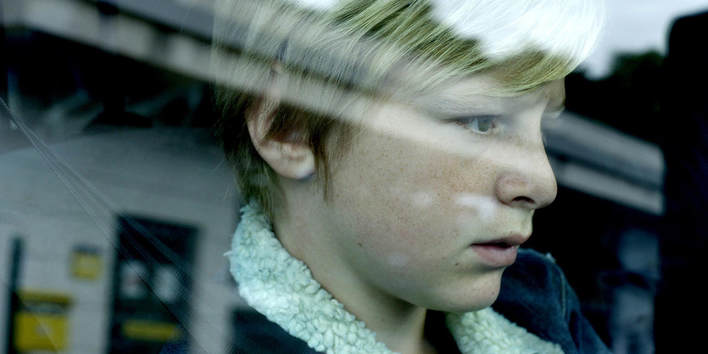CUSTODY
****
Director: Xavier Legrand
Screenwriter: Xavier Legrand
Principal cast:
Léa Drucker
Denis Ménochet
Thomas Gloria
Mathilde Auneveux
Country: France
Classification: M
Runtime: 93 mins.
Australian release date: 27 September 2018
Previewed at: Palace Central, Sydney, on 5 September 2018.
“Nothing here is black and white,” says Antoine’s barrister in the custody case at the heart of Xavier Legrand’s feature directorial debut Custody, a gripping yarn that becomes more intense as this examination of a crumbling marriage unfolds. Or, as the magistrate bluntly puts it, “Which of you is the biggest liar?” Legrand won the Silver Lion for Best Director at last year’s Venice International Film Festival and his film has also gone on to win a swag of international film festival awards in its wake, which comes as no surprise. It’s a powerful, disturbing tale, and a timely one because the phenomenon of domestic violence is now openly discussed, having been whispered about for so many years. To quote the Australian Institute of Health and Welfare, in this country, tragically, “Intimate partner violence causes more illness, disability and deaths than any other risk factor for women aged 25–44.”
At the film’s outset, Miriam Besson (Léa Drucker) is in court with her divorced husband Antoine (Denis Ménochet), facing a female magistrate across the table in a closed hearing. She is being questioned about their 11-year-old son Julien’s (Thomas Gloria) request to stop his joint custody; for some unknown reason the child does not want to be in his father’s company. The couple’s daughter Joséphine (Mathilde Auneveux), on the other hand, is almost 18 so is considered old enough to make up her own mind. Miriam has taken the children to live elsewhere but Antoine wants to remain in contact with his estranged family, so the court upholds his custody rights. When he picks up Julien from the home of his parents-in-law, neutral territory, he tries to pit his son against his mother and it becomes evident that his behaviour unnerves Julien, whose anxiety radiates from the screen. As the circumstances become more fraught and Antoine seems to be losing control, the situation becomes more desperate and eventually there is an irreconcilable breakdown between the warring parties, leading to a cathartic conclusion.
Custody is an unnerving experience and the uneasy atmosphere on screen is a credit to the director, his taut script and the performances of the leads. Legrand concentrates on the emotional wrench that occurs when there are children caught in the midst of a relationship breakdown. In this case we have a brother and sister, but the catch is that only one of them is legally too young to make up his own mind and is at the mercy of the court’s decision. Young Thomas Gloria is outstanding as the boy who lives in fear of his weekend appointments with his father and he exudes a sense of dread when he’s in his dad’s company. There is one particular scene in Antoine’s van that is extraordinarily heart-rending and reminded me of an equally disturbing passage in Andrey Zvyagintsev’s Loveless, released earlier this year, when young Alyosha (Matvey Novikov) overhears his parents talking about him. Auneveux’s performance is equally strong as the boy’s sister, a girl who just wants to be removed from the situation as much as possible. Ménochet and Drucker are both magnificent in their roles and their characters’ anxieties and emotions are etched on their faces.
Custody is a difficult film to watch at times and you feel for everyone involved. The most frightening aspect is that the film is ostensibly about a man who believes he ‘owns’ the very people who don’t want anything more to do with him. He honestly feels that he is the victim, believing his own delusion. Legrand explains, “I adopted a dramatic approach in which we do follow a ‘hero’, Antoine, but from the point of view of the various obstacles he has to overcome to achieve his ends: the judge, his son and his ex-wife. As such, the spectator experiences the judge’s doubts, the pressure the child is subjected to and the terror of the hunted wife in real time. I wanted to provide a political and universal reading to the topic, while immersing the spectator in the history of genre cinema (that of a monster seeking its prey), in which the suspense and tension feed the narrative and vice-versa.” It’s an interesting approach and an impressive achievement in that he’s pulled it off so well - Custody is the most powerful 93 minutes you’ll spend in the cinema this year.
